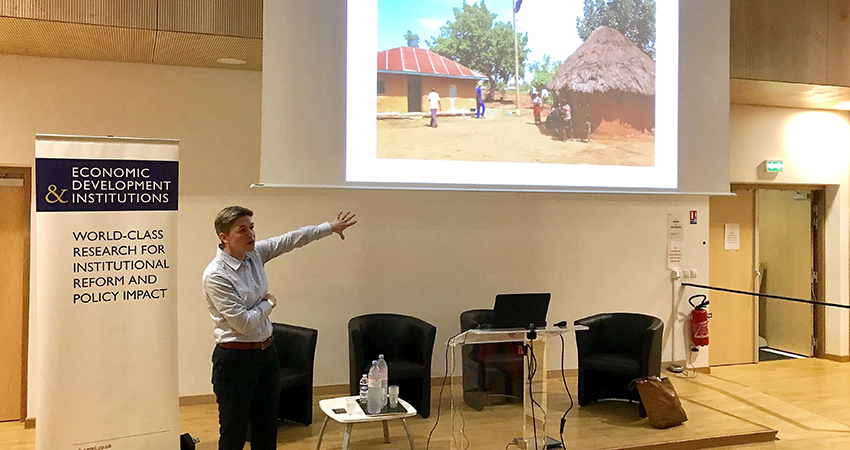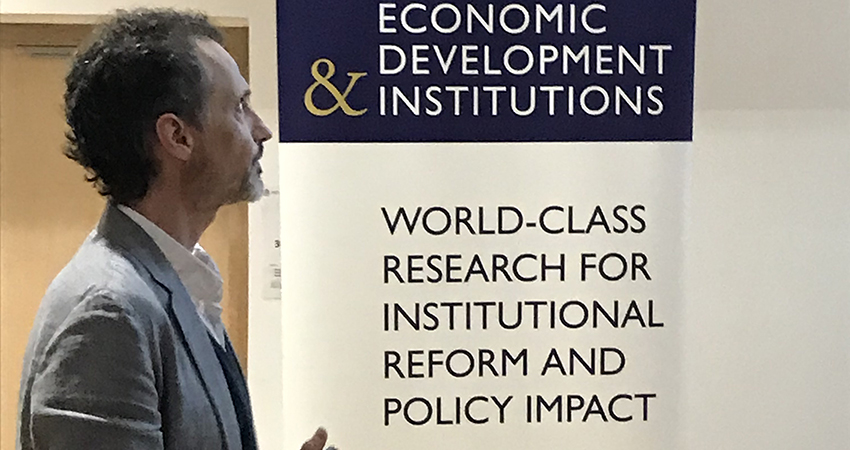2019 EDI Conference
EDI hosted its General Conference in Paris on 3 and 4 June 2019, which was attended by nearly 50 EDI researchers, members of the scientific committees, independent advisory committee and programme management staff.
Watch highlights from the 2019 EDI development conference:
With EDI research progressing strongly, this conference was the first opportunity to see early insights from across our 61 funded research projects and 4 country institutional diagnostics. The presentations demonstrated how far we have come. EDI is an academic research initiative with deep theoretical foundations – how institutions shape, constrain and interact with economic development. But the programme has also a strong practical dimension – what practical insights can we derive for how to improve economic development. This conference provided insights into both.

Our institutional diagnostic is an ambitious endeavour to develop a framework that will permit policy-makers to identify weak institutional areas that constrain development and appropriate directions for reform. It goes beyond more traditional growth diagnostics or country studies in investigating the chain of causality between ‘proximate causes’ and ‘deep factors’ constraining a country’s pathway. Our first study on Tanzania completed in September 2018 and we are seeing early indications of impact. EDI’s institutional diagnostic of Benin will be published this summer and of Bangladesh at the end of this year. Our fourth country study on Mozambique has just launched.

EDI is looking at practical tests of reform proposals through a total of 30 randomised control trials (RCTs). This conference highlighted a subset of five projects on: performance contracts for primary school teachers in Rwanda (Zeitlin, Leaver et al); women’s rights in Pakistan (Field and Vyborny); property tax in Senegal (Gurgand, Pouliquen et al); improving court efficiency in Kenya, Tanzania and India (Siddiqi); and rural electrification in Kenya (Miguel, Berkouwer et al). Projects are at varying stages – some have just started, some are nearing completion with direct policy impact. The project on women’s rights in Pakistan (Field and Vyborny) has won support from key stakeholders to reform India’s marriage contract. (Read our News update about the research.) Our project on politician selection in Sierra Leone (by Casey et al) has obtained widespread and high-ranking support among national electoral institutions and strong willingness to replicate in future elections. EDI’s RCT on Mexico’s labour court has had direct influence on legislation – the country’s Senate passed into law on 1 May 2019 what has been dubbed ‘Mexico’s most significant labour reform in more than a century’, with direct input by our RCT lead researchers Sadka and Woodruff.
EDI’s fourth research area involves 31 case studies on the interactions between formal and informal institutions in relation to growth and development. During the conference, researchers presented early insights from five projects: gangs of Medellin (Blattman and Tobon); land rights in Tanzania (Genicot); economic role of clans (Guirkinger et al); historical roots of female genital cutting (La Ferrara et al); productivity of Ghana’s civil service (Dercon, Williams et al); and child marriage law in Bangladesh (Wahhaj et al). Research insights of findings and working papers are available on our EDI website for some of these projects and others that are at advanced stages.
The conference also highlighted emerging linkages across projects. This includes, but is not limited to, the themes of land rights, the judiciary and the civil service that are prominent across several of our RCTs, case studies and country institutional diagnostics. Our RCT on women’s rights in Pakistan and case study on child marriage in Bangladesh both examine the difficult area of marriage contracts through different methodologies. A case study, as well as an RCT, examine the role of community policing and gangs in Medellin, which in turn is linked to an RCT on community policing in Uganda. The EDI programme will continue to draw insights from across its projects as they advance in forthcoming videos and future synthesis.




